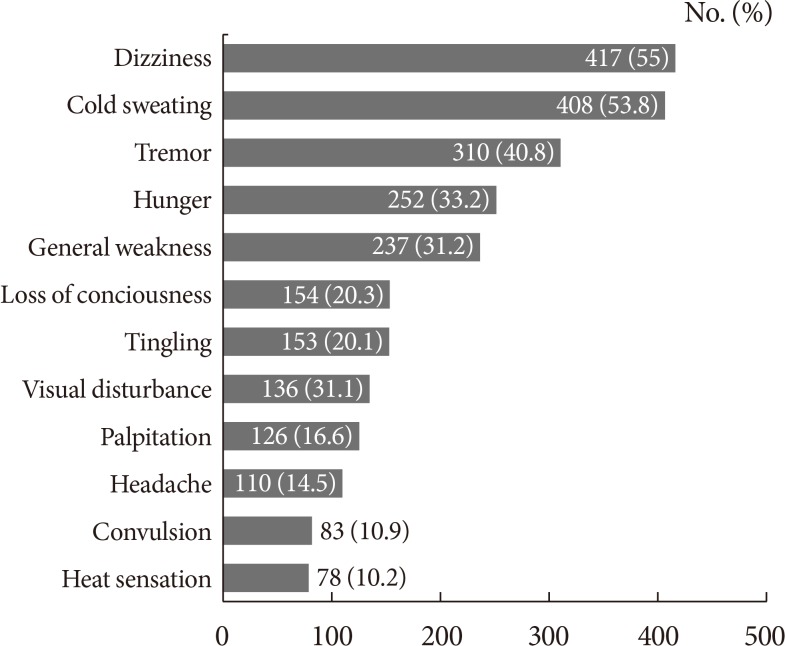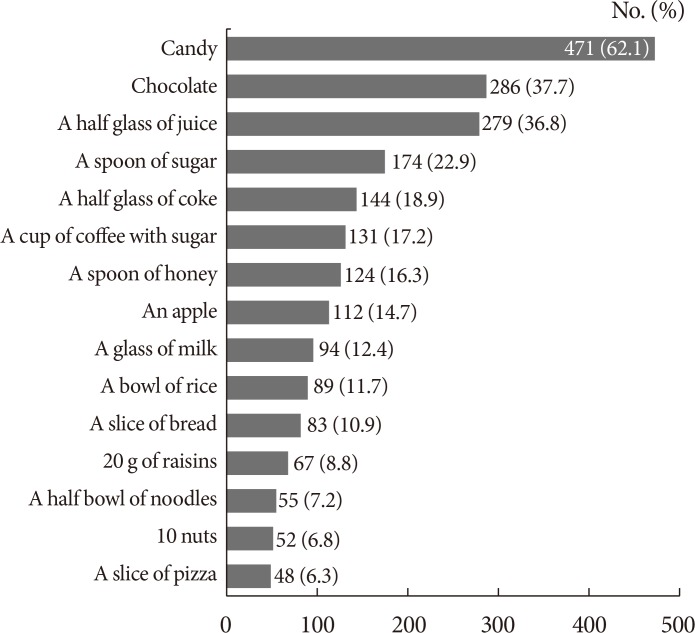Diabetes Metab J.
2018 Feb;42(1):43-52. 10.4093/dmj.2018.42.1.43.
Patient Understanding of Hypoglycemia in Tertiary Referral Centers
- Affiliations
-
- 1Department of Internal Medicine, Keimyung University School of Medicine, Daegu, Korea. hsk12@dsmc.or.kr
- 2Department of Internal Medicine, Eulji University Hospital, Eulji University School of Medicine, Daejeon, Korea.
- 3Department of Internal Medicine, Catholic University of Daegu School of Medicine, Daegu, Korea.
- 4Department of Internal Medicine, Yeungnam University College of Medicine, Daegu, Korea.
- 5Department of Internal Medicine, Soonchunhyang University Gumi Hospital, Soonchunhyang University College of Medicine, Gumi, Korea.
- 6Department of Internal Medicine, CHA Gumi Medical Center, CHA University, Gumi, Korea.
- 7Department of Internal Medicine, Daegu Fatima Hospital, Daegu, Korea.
- KMID: 2409185
- DOI: http://doi.org/10.4093/dmj.2018.42.1.43
Abstract
- BACKGROUND
Hypoglycemia is an important complication in the treatment of patients with diabetes. We surveyed the insight by patients with diabetes into hypoglycemia, their hypoglycemia avoidance behavior, and their level of worry regarding hypoglycemia.
METHODS
A survey of patients with diabetes, who had visited seven tertiary referral centers in Daegu or Gyeongsangbuk-do, Korea, between June 2014 and June 2015, was conducted. The survey contained questions about personal history, symptoms, educational experience, self-management, and attitudes about hypoglycemia.
RESULTS
Of 758 participants, 471 (62.1%) had experienced hypoglycemia, and 250 (32.9%) had experienced hypoglycemia at least once in the month immediately preceding the study. Two hundred and forty-two (31.8%) of the participants had received hypoglycemia education at least once, but only 148 (19.4%) knew the exact definition of hypoglycemia. Hypoglycemic symptoms identified by the participants were dizziness (55.0%), sweating (53.8%), and tremor (40.8%). They mostly chose candy (62.1%), chocolate (37.7%), or juice (36.8%) as food for recovering hypoglycemia. Participants who had experienced hypoglycemia had longer duration of diabetes and a higher proportion of insulin usage. The mean scores for hypoglycemia avoidance behavior and worry about hypoglycemia were 21.2±10.71 and 23.38±13.19, respectively. These scores tended to be higher for participants with higher than 8% of glycosylated hemoglobin, insulin use, and experience of emergency room visits.
CONCLUSION
Many patients had experienced hypoglycemia and worried about it. We recommend identifying patients that are anxious about hypoglycemia and educating them about what to do when they develop hypoglycemic symptoms, especially those who have a high risk of hypoglycemia.
Keyword
MeSH Terms
Figure
Cited by 2 articles
-
Letter: Patient Understanding of Hypoglycemia in Tertiary Referral Centers (Diabetes Metab J 2018;42:43-52)
Jae-Han Jeon
Diabetes Metab J. 2018;42(2):173-174. doi: 10.4093/dmj.2018.42.2.173.Response: Patient Understanding of Hypoglycemia in Tertiary Referral Centers (Diabetes Metab J 2018;42:43-52)
Nan Hee Cho, Hye Soon Kim
Diabetes Metab J. 2018;42(2):175-176. doi: 10.4093/dmj.2018.42.2.175.
Reference
-
1. Diabetes Control and Complications Trial Research Group. Nathan DM, Genuth S, Lachin J, Cleary P, Crofford O, Davis M, Rand L, Siebert C. The effect of intensive treatment of diabetes on the development and progression of long-term complications in insulin-dependent diabetes mellitus. N Engl J Med. 1993; 329:977–986. PMID: 8366922.
Article2. Gaede P, Lund-Andersen H, Parving HH, Pedersen O. Effect of a multifactorial intervention on mortality in type 2 diabetes. N Engl J Med. 2008; 358:580–591. PMID: 18256393.
Article3. UK Prospective Diabetes Study (UKPDS) Group. Intensive blood-glucose control with sulphonylureas or insulin compared with conventional treatment and risk of complications in patients with type 2 diabetes (UKPDS 33). Lancet. 1998; 352:837–853. PMID: 9742976.4. Green AJ, Fox KM, Grandy S. SHIELD Study Group. Self-reported hypoglycemia and impact on quality of life and depression among adults with type 2 diabetes mellitus. Diabetes Res Clin Pract. 2012; 96:313–318. PMID: 22296853.
Article5. Williams SA, Pollack MF, Dibonaventura M. Effects of hypoglycemia on health-related quality of life, treatment satisfaction and healthcare resource utilization in patients with type 2 diabetes mellitus. Diabetes Res Clin Pract. 2011; 91:363–370. PMID: 21251725.
Article6. Zhao Y, Campbell CR, Fonseca V, Shi L. Impact of hypoglycemia associated with antihyperglycemic medications on vascular risks in veterans with type 2 diabetes. Diabetes Care. 2012; 35:1126–1132. PMID: 22432106.
Article7. Zoungas S, Patel A, Chalmers J, de Galan BE, Li Q, Billot L, Woodward M, Ninomiya T, Neal B, MacMahon S, Grobbee DE, Kengne AP, Marre M, Heller S. ADVANCE Collaborative Group. Severe hypoglycemia and risks of vascular events and death. N Engl J Med. 2010; 363:1410–1418. PMID: 20925543.
Article8. Hsu PF, Sung SH, Cheng HM, Yeh JS, Liu WL, Chan WL, Chen CH, Chou P, Chuang SY. Association of clinical symptomatic hypoglycemia with cardiovascular events and total mortality in type 2 diabetes: a nationwide population-based study. Diabetes Care. 2013; 36:894–900. PMID: 23223349.9. Action to Control Cardiovascular Risk in Diabetes Study Group. Gerstein HC, Miller ME, Byington RP, Goff DC Jr, Bigger JT, Buse JB, Cushman WC, Genuth S, Ismail-Beigi F, Grimm RH Jr, Probstfield JL, Simons-Morton DG, Friedewald WT. Effects of intensive glucose lowering in type 2 diabetes. N Engl J Med. 2008; 358:2545–2559. PMID: 18539917.10. Standards of medical care in diabetes-2016: summary of revisions. Diabetes Care. 2016; 39(Suppl 1):S4–S5. PMID: 26696680.11. Cooke D, Bond R, Lawton J, Rankin D, Heller S, Clark M, Speight J. U.K. NIHR DAFNE Study Group. Structured type 1 diabetes education delivered within routine care: impact on glycemic control and diabetes-specific quality of life. Diabetes Care. 2013; 36:270–272. PMID: 23139374.12. Cochran J, Conn VS. Meta-analysis of quality of life outcomes following diabetes self-management training. Diabetes Educ. 2008; 34:815–823. PMID: 18832286.
Article13. Norris SL, Lau J, Smith SJ, Schmid CH, Engelgau MM. Self-management education for adults with type 2 diabetes: a meta-analysis of the effect on glycemic control. Diabetes Care. 2002; 25:1159–1171. PMID: 12087014.14. Gonder-Frederick LA, Schmidt KM, Vajda KA, Greear ML, Singh H, Shepard JA, Cox DJ. Psychometric properties of the hypoglycemia fear survey-II for adults with type 1 diabetes. Diabetes Care. 2011; 34:801–806. PMID: 21346182.
Article15. Cox DJ, Irvine A, Gonder-Frederick L, Nowacek G, Butterfield J. Fear of hypoglycemia: quantification, validation, and utilization. Diabetes Care. 1987; 10:617–621. PMID: 3677982.
Article16. Zammitt NN, Frier BM. Hypoglycemia in type 2 diabetes: pathophysiology, frequency, and effects of different treatment modalities. Diabetes Care. 2005; 28:2948–2961. PMID: 16306561.18. Edridge CL, Dunkley AJ, Bodicoat DH, Rose TC, Gray LJ, Davies MJ, Khunti K. Prevalence and incidence of hypoglycaemia in 532,542 people with type 2 diabetes on oral therapies and insulin: a systematic review and meta-analysis of population based studies. PLoS One. 2015; 10:e0126427. PMID: 26061690.
Article19. Brown SA. Interventions to promote diabetes self-management: state of the science. Diabetes Educ. 1999; 25(6 Suppl):52–61. PMID: 10711085.
Article20. Gary TL, Genkinger JM, Guallar E, Peyrot M, Brancati FL. Meta-analysis of randomized educational and behavioral interventions in type 2 diabetes. Diabetes Educ. 2003; 29:488–501. PMID: 12854339.
Article21. Deakin T, McShane CE, Cade JE, Williams RD. Group based training for self-management strategies in people with type 2 diabetes mellitus. Cochrane Database Syst Rev. 2005; (2):CD003417. PMID: 15846663.
Article22. Renders CM, Valk GD, Griffin SJ, Wagner EH, Eijk Van JT, Assendelft WJ. Interventions to improve the management of diabetes in primary care, outpatient, and community settings: a systematic review. Diabetes Care. 2001; 24:1821–1833. PMID: 11574449.23. Brod M, Christensen T, Thomsen TL, Bushnell DM. The impact of non-severe hypoglycemic events on work productivity and diabetes management. Value Health. 2011; 14:665–671. PMID: 21839404.
Article24. Wild D, von Maltzahn R, Brohan E, Christensen T, Clauson P, Gonder-Frederick L. A critical review of the literature on fear of hypoglycemia in diabetes: implications for diabetes management and patient education. Patient Educ Couns. 2007; 68:10–15. PMID: 17582726.
Article25. Cox DJ, Gonder-Frederick L, Antoun B, Clarke W, Cryer P. Psychobehavioral metabolic parameters of severe hypoglycemic episodes. Diabetes Care. 1990; 13:458–459. PMID: 2318112.
Article26. Shiu AT, Wong RY. Fear of hypoglycaemia among insulin-treated Hong Kong Chinese patients: implications for diabetes patient education. Patient Educ Couns. 2000; 41:251–261. PMID: 11042428.
Article27. Marrett E, Radican L, Davies MJ, Zhang Q. Assessment of severity and frequency of self-reported hypoglycemia on quality of life in patients with type 2 diabetes treated with oral antihyperglycemic agents: a survey study. BMC Res Notes. 2011; 4:251. PMID: 21777428.
Article28. Green L, Feher M, Catalan J. Fears and phobias in people with diabetes. Diabetes Metab Res Rev. 2000; 16:287–293. PMID: 10934458.
Article29. Vignesh JP, Mohan V. Hypoglycaemia unawareness. J Assoc Physicians India. 2004; 52:727–732. PMID: 15839452.30. Polonsky WH, Davis CL, Jacobson AM, Anderson BJ. Correlates of hypoglycemic fear in type I and type II diabetes mellitus. Health Psychol. 1992; 11:199–202. PMID: 1618174.
Article31. Irvine AA, Cox D, Gonder-Frederick L. Fear of hypoglycemia: relationship to physical and psychological symptoms in patients with insulin-dependent diabetes mellitus. Health Psychol. 1992; 11:135–138. PMID: 1582382.
Article32. Gold AE, Frier BM, MacLeod KM, Deary IJ. A structural equation model for predictors of severe hypoglycaemia in patients with insulin-dependent diabetes mellitus. Diabet Med. 1997; 14:309–315. PMID: 9113485.
Article33. Piatt GA, Orchard TJ, Emerson S, Simmons D, Songer TJ, Brooks MM, Korytkowski M, Siminerio LM, Ahmad U, Zgibor JC. Translating the chronic care model into the community: results from a randomized controlled trial of a multifaceted diabetes care intervention. Diabetes Care. 2006; 29:811–817. PMID: 16567820.
Article34. Piatt GA, Anderson RM, Brooks MM, Songer T, Siminerio LM, Korytkowski MM, Zgibor JC. 3-Year follow-up of clinical and behavioral improvements following a multifaceted diabetes care intervention: results of a randomized controlled trial. Diabetes Educ. 2010; 36:301–309. PMID: 20200284.35. Stellefson M, Dipnarine K, Stopka C. The chronic care model and diabetes management in US primary care settings: a systematic review. Prev Chronic Dis. 2013; 10:E26. PMID: 23428085.
Article36. Ostenson CG, Geelhoed-Duijvestijn P, Lahtela J, Weitgasser R, Markert Jensen M, Pedersen-Bjergaard U. Self-reported non-severe hypoglycaemic events in Europe. Diabet Med. 2014; 31:92–101. PMID: 23796113.
- Full Text Links
- Actions
-
Cited
- CITED
-
- Close
- Share
- Similar articles
-
- Response: Patient Understanding of Hypoglycemia in Tertiary Referral Centers (Diabetes Metab J 2018;42:43-52)
- Letter: Patient Understanding of Hypoglycemia in Tertiary Referral Centers (Diabetes Metab J 2018;42:43-52)
- Are Characteristics of Korean Constipation Patients Who Visited a Tertiary Referral Center Different from Those of Western Patients?
- Development and Analysis of System Dynamics Model for Predicting on the Effect of Patient Transfer Counseling with Nurses
- Differences among Ophthalmology Patients Referred to Tertiary Medical Centers according to Referral Hospital



